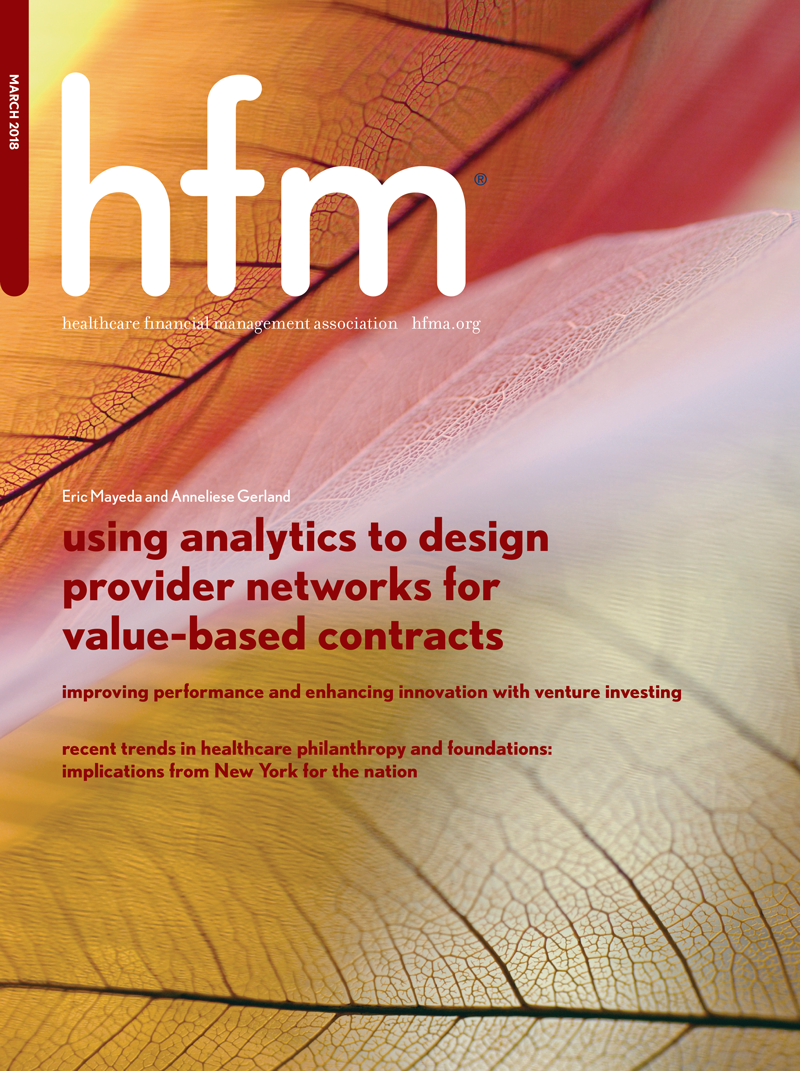
Cover Story
Using Analytics to Design Provider Networks for Value-Based Contracts
Obtaining and analyzing the right data can help healthcare organizations thoughtfully and successfully plan provider networks with an eye toward value.
By Eric Mayeda and Anneliese Gerland
From the President’s Desk
|
Figure: exit rich text editor to add content |
Expanding on thoughts in his March 2018 column in hfm, HFMA President and CEO Joseph J. Fifer, FHFMA, CPA, talks about the importance of aligning organizational cultures when hospitals and health systems merge. |
Video: Predictive Analytics and the Revenue Cycle
Paul Bradley, chief data scientist for ZirMed, discusses how predictive analytics can be used to find lost revenue, improve the patient experience, and increase patient satisfaction.
Early Edition
Optimizing a Physician Practice Acquisition
A health system that is contemplating a physician practice acquisition should have a defined strategic approach for ensuring that the targeted practice will perform optimally, be competitive in the marketplace, and ultimately contribute to the overall organization’s success from a business standpoint.
By Ken Bradley
The Future of VACs: Valuation and Strategic Considerations
Changes in payment may have a bearing the preferred setting for delivery of services furnished by vascular access centers (VACs), outpatient facilities that specialize in treatment of patients with end-stage renal disease who have problems with vascular access.
By Brad Brumbaugh, CFA, CBA, Jason Ruchaber, CFA, ASA, and Silas Eldredge
Healthcare Matters
Debunking MACRA Myths: Hospitals’ Vital Role in Physician Success
As clinicians bear more risk in healthcare payment models under the Medicare Access and CHIPS Reauthorization Act, the onus will be on hospitals to support the efforts of their physician employees.
By Sreeram Mantha
Features
Improving Performance and Enhancing Innovation With Venture Investing: Perspectives From Leading Health Systems
Health system leaders describe their strategic approaches to venture investing and share the insights and perspectives that have informed those approaches.
By David G. Anderson, PhD, Mary Jo Potter, and Dudley E. Morris
Read the full report
Recent Trends in Healthcare Philanthropy and Foundations: Implications From Activities in New York for the Nation
A study of foundation strategies of hospitals in New York State aimed at promoting philanthropy yielded insights for foundation activities of all U.S. hospitals.
By Walter J. Dillingham, Jr.
Low-Cost Strategies to Strengthen Cybersecurity
The growing sophistication of hackers and their tools make healthcare organizations a prime target for cyberattack.
By Robert E. Anderson, Jr
Focus Areas
Accounting
Tax Reform Implications for Healthcare Organizations
Tax-exempt hospitals prepare for the impact of provisions of the Tax Cuts and Jobs Act (TCJA) of 2017, including the repeal of the individual mandate under the Affordable Care Act and changes to tax incentives for charitable giving.
By Chris Bell, CPA
Cost and Quality
Minimizing Readmission Penalties with Palliative Care
Hospitals that invest in palliative care programs may reduce readmission penalties.
By Allison Silvers, MBA, and Maggie Rogers, MPH
Columns
From the Chair
Reach for the Heart: A Plea for Healthcare Finance Leaders
Healthcare finance professionals should use data to tell stories that resonate with listeners, including clinicians, on both a personal and an intellectual level.
By Carol A. Friesen, FHFMA, MPH
From the President
Culture Still Eats Strategy for Breakfast
HFMA/Deloitte research reveals the importance of cultural alignment to successful hospital mergers.
By Joseph J. Fifer, FHFMA, CPA
Eye On Washington
The “Disruptors” Move Into Health Care
Healthcare joint ventures involving U.S. corporations, such as one announced by Amazon, Berkshire Hathaway, JPMorgan Chase, could significantly disrupt the nation’s healthcare system.
By Gail R. Wilensky, PhD
On Point
Increasing Consumer Engagement and Empowerment to Drive Value in Health Care
Trends toward increased consumer cost-sharing, consumer engagement, and calls for transparency have significant implications for U.S. hospitals.
By Lia Winfield, PhD
Healthcare Innovation
What the Tax Cuts and Jobs Act Means for Health Care
The Tax Cuts and Jobs act will affect health care in various ways.
By Ken Perez
Capital Finance
Finding Healthcare Finance Reality in a Cloud of Possibility
Integrated risk planning enables organizations to manage variability and to succeed under an ever-shifting cloud of possibility.
By David Ratliff, CFA, and Eric A. Jordahl
Business Intelligence
Real-Time Location Systems: An Underused But Valuable Source of Data
Systems that track the movement of equipment throughout a hospital also can be used to collect data on compliance, physician time, and other key areas that affect finance and patient satisfaction.
By Anne Bugge
Departments
Data Trends
ALOS Analysis Reveals Significant Regional Variances
An analysis of average length of stay looking at U.S. hospitals identified noteworthy variation among states within each of four regions.
Supplement
HFMA White Paper Highlight
Best Practices for Improving Patient Collections
Sponsored by Experian Health
This article highlights a white paper that analyzes the results of two recently fielded surveys about the current state of patient collections and emerging best practices to improve performance.





